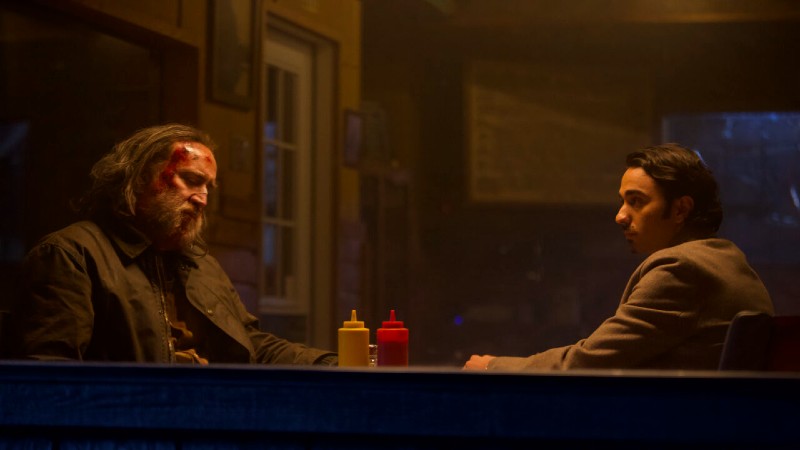Robin Feld (Cage), a mysterious truffle hunter who lives in the Oregon wilderness with his beloved pig. He cuisines and sells his truffles to Amir (Alex Woolf), a sleazy agent of the Portland dining scene. After his pig is inexplicably taken from him Robin embarks on a pursuit into the city, with strange and emotional results.
Despite his grumpiness, Feld is a true hero – a man who would risk everything to save the titular animal. The people he meets in the city are fittingly opposite, drained of feeling and retro-fitted to serve monetary interests. Pig presents an emotionally engaging conflict: Feld is put in several situations where his humanity clashes with the robotic nature of his antagonists. Like a spiritual truthsayer, he uses his outsider status to hold a mirror to the other characters’ inadequacies. When walking through a dark, underground corridor he insists Amir not use his phone. “You’ll get used to it”, he says, in tune with the darkness.
In a stand-out scene, he helps remind a former-colleague-turned-top-chef of his lost dream to open a humble English pub, instantly exposing his current, fancier pretensions as meaningless. Feld reminds both him and the audience that “we don’t get a lot of things to love”, a message the rest of the film stresses with dexterity.
Pig touches in its portrayal of grief – it is a deeply felt story about characters who, through loss, have been robbed of feeling. Feld’s search for the pig becomes a means to simultaneously deal with the death of his own wife, which he has struggled to come to terms with. Similarly, Darius (Adam Arkin) is deeply affected by the tragic dynamic between himself, his dying wife and his son, Amir (Alex Woolf). The main characters are strangely linked through their losses, which then leads to a collective kind of mourning – they appear to have no reason to settle their difference, yet they find common ground through these unfortunate events. Sarnoski’s revenge set-up is a fairly boiler-plate one but his handling of these weighty themes elevates it beyond standard fare.

Pig’s marketing has largely centred around the appearance of Nicolas Cage in a more-grounded-than-usual role. His performance is surprisingly nuanced, yes, though fans of his manic style will be pleased to see that he has not lost his trademark showiness. At times, his grizzly, worn out demeanour teeters very finely on the line between comedy and drama, which is exacerbated by his occasionally excessive mumbling. Ultimately though, Cage’s performance deserves the praise it has received. His intense, physical portrayal conveys the most important message – we believe that Feld cares deeply for his pig, and by the end of the film we become nearly as invested as he is. We also understand that he is suffering greatly from other past tragedies without the plot needing to explain them in detail.
As was perhaps expected, Pig is a pretty odd affair. Initially, the film struggles to find tonal footing as it engages in its mash-up of western, drama and cuisine. Perhaps because of this oddball nature, it narrowly falls short of excellence. The restaurant scene with Chef Finway (David Knell) is somewhat hurt by Knell’s off-putting, hammy performance and the underground chef punch-up feels like a culinary parody of Fight Club (David Fincher, 1999).Still, as Pig moves along these disparate elements become charming. In some ways, Sarnoski has made the film that Chef (Jon Favreau, 2014) aspired to be – it certainly does a better job of articulating the importance of food to memory and livelihood. Its weirdness is initially difficult to engage with but it is eventually winning. It has the potential, like its star, to become a cult favourite.
Pig is a must see for fans of The Cage, but it more importantly transcends his presence by offering a nuanced and heartfelt portrayal of grief. Its a film that wants both its characters and audience to feel – and this it achieves.
Pig is available now on all major VoD platforms.








